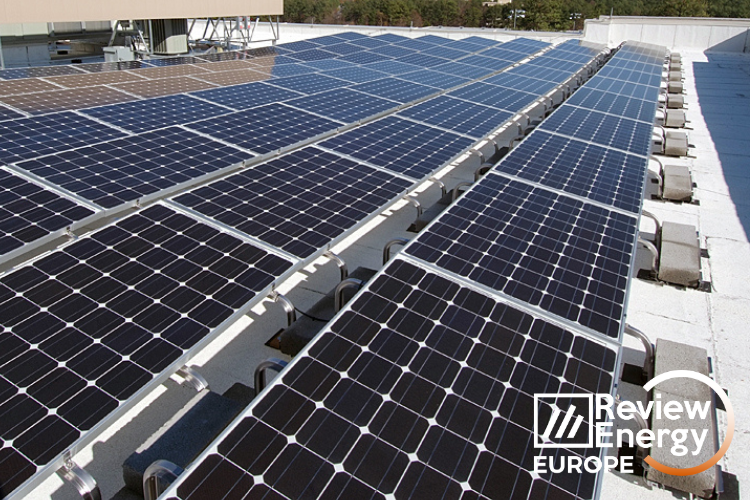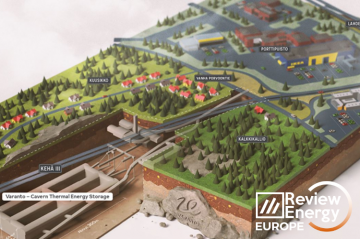
UK wants to exploit the potential of rooftop solar installations on commercial buildings
Schools, warehouses and car parks could be at the forefront of a revolution in affordable solar power, under plans discussed at the first meeting of the Government’s new Solar Taskforce.
The Government has a clear target to increase solar capacity by nearly fivefold to 70 GW by 2035 as part of wider plans to power up Britain with cleaner, cheaper and more secure energy sources. Even when this is met, the UK would be using only a very small proportion of its land mass for solar panels.
Already over a million UK homes have solar panels fitted to their roofs, providing reliable energy for homes across the UK while significantly reducing consumer bills and creating thousands of high skilled jobs across the country as part of growing our economy. However, the Taskforce, led by Energy Minister Graham Stuart and Solar Energy UK chief executive Chris Hewett highlighted the untapped potential of commercial buildings, schools, warehouses and car parks, as well as the possibility of floating solar.
The Government pledged to establish a Taskforce to drive the further growth of solar power as part of Powering Up Britain, accepting the recommendation made by Chris Skidmore in his Independent Review of Net Zero identifying how the UK could meet its net zero commitments in an affordable and efficient manner.
Minister for Energy Security and Net Zero Graham Stuart said that "households across the UK are already doing their bit to provide cleaner, cheaper and more secure energy sources with the solar panels on their roofs – but with acres of rooftop space on car parks and supermarkets in every community, we can be doing even more. This new dedicated Solar Taskforce will have a laser-like focus on cutting the costs and breaking down the barriers to harnessing the power of the sun in every way we can, all while using a small fraction of this country’s land.
Chris Hewett, chief executive of Solar Energy UK and co-chair of the Taskforce, added that "installing rooftop solar power, whether at residential or commercial scale, is one of the best investments available, offering dramatic savings on energy bills and the opportunity to be paid for sending excess power to the grid. The benefits can also be greatly enhanced by adding a battery storage system.
Hewet explained that solar is the "most popular form of power generation amongst the British public and consumer demand has never been higher, though the rate of rooftop installation must double to help hit 70 GW by 2035. The number of solar farms will also have to increase significantly. I am delighted we now have industry leaders working directly with the Government to resolve the stumbling blocks and maximise the benefits that solar energy offers to the nation.
Part of the discussion at its first meeting was how to drive more rooftop installation, such as enabling cost reductions for households and businesses looking to install solar panels, so that even more can reap the benefits of solar power such as reducing their bills.
This would come on top of solar panels on the ground – with the Taskforce united that the solar and farming sectors can support each other in meeting energy security goals and maintaining our country’s food security.
The Taskforce also discussed plans to:
- Publish a solar roadmap in 2024 to drive forward the actions needed to deliver the UK’s ambition to increase solar capacity by nearly fivefold by 2035;
- Upskill and expand the solar workforce to meet increasing levels of demand, while creating well-paid long-term employment opportunities for Britain; and
- Identify opportunities to secure resilient supply chains and innovation within the global market, helping to generate opportunities for UK businesses to export their expertise around the world.
The Taskforce will be supporting the UK’s solar industry at a time when it is going from strength to strength:
- Over 99 per cent of the UK’s solar capacity – both on the ground and on rooftops – has been installed since May 2010 – equivalent to powering nearly four million homes;
- In 2020, the solar industry supported 11,500 jobs across the country – with that figure now expected to be even higher; and
- In March this year, over 19,000 smaller-scale rooftop installations were made, at a rate of more than 500 a day. If this continues, there will be 230,000 installations in 2023 – beating the current record set in 2011.
Ben Fawcett, Head of Solar at EDF Renewables UK and member of the Solar Taskforce, said "if we are to achieve our net zero ambitions, we need to drive forward the deployment of all types of solar, from rooftops to small and large utility-scale solar farms. By bringing the government and industry together, the Solar Taskforce is a great step in the right direction as we work hard to unlock the potential of solar in the UK".
At the same time, Lawrence Slade, Chief Executive, Energy Networks Association, which represents the UK’s energy network operators, added "I’m looking forward to working with Minister Stuart and his department, as well as partners across the industry on tackling the challenges we face on the road to net zero. We know accelerating and improving grid connections is one such challenge and linking the work of the taskforce up with our industry action plan is going to be crucial".
Finally, Chief Executive of renewable energy standards body MCS Ian Rippin said that "the growth we’ve seen highlights the appetite for solar PV and does give some insight into the growing reliance on home-grown energy in the UK. More people are turning to renewable solutions to generate their own power at home and it’s great to see increasing levels of confidence in solar".









Comentarios
Sé el primero en comentar...